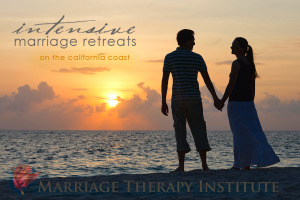Our relationship to ourself drives everything.
How we feel inside is how we live our lives and how we love one another. Marriage Therapy Institute Offers 7-10 day Intensive Marriage Retreats for Couples
Marriage Therapy Institute Offers 7-10 day Intensive Marriage Retreats for CouplesConsider giving yourselves a gift. A really important, maybe life-changing, marriage-saving gift.
Consider a solution that could really work for you. With over 30 years of experience, we’ve found Intensive Couples/Marriage Retreats to be, by far, the most successful option available to couples who are struggling to get their lives and love relationship back together.
Dr. Mark Schwartz and Lori Galperin, MSW have, over the years, developed a very unique program. Each day, each partner is seen individually, followed by a couple’s session altogether. The examination of the blocks to intimacy – the deeper work – is provided during individual sessions.The couple’s joint work is directive, with specific daily “homework assignments” designed to provide skills training in areas such as effective communication, problem-solving, time-management, parenting, sexual intimacy, constructive and destructive anger, and last but not least: passion creation.
Consider taking a vacation just for relationship. Allow yourself to return to an atmosphere of fun and play, an atmosphere that will help you breathe new life into the relationship. Walk along the beach while enjoying the sunset, have dinner at any one of many fine restaurants, then submerge on the nightly relationship-enhancing homework. Spend 7 to 10 days in a beautiful part of the country in a resort-like setting, away from everyday pressures and responsibilities, your work and the children.
This is a Marriage/Couples Intensive Retreat and it’s an incredibly effective way to resurrect, review, and save a relationship. One 90-minute session in the morning focuses on couple’s issues, and one late in the afternoon works on the past baggage that has been blocking intimacy with your partner. This past baggage can be issues that emerged in infancy and early childhood. More and more research is showing that our early interactions with caretakers affect our ability to form healthy bonds and can write the blueprint for later relationships.
Early developmental traumas can drive the individual to reenact destructive or confusing early experiences. Revisiting these earlier traumas while the partner is in the room often brings clarity to the origin of many current day arguments. Often these arguments are flashbacks, of a sort, triggered more by the past than the present. This realization alone can create understanding and compassion where conflict and confusion reigned. Additionally, learning how to be more considerate, passionate, mindful and loving on a day-to-day basis encourages the partner to reciprocate. Couples who couldn’t stand one another eventually rediscover the affection that was initially the glue of their relationship.
Marriage Therapy Institute offers one of the best marital retreats available, and its offered in gorgeous Monterey, California, with Marriage Therapy Institute’s nationally reknown therapists Dr. Mark Schwartz and Lori Galperin, MSW, both of whom where once part of the Masters & Johnson Institute team.
With more than 25 years’ experience helping hundreds of couples, their retreat interweaves the magic of whale watching, hiking through Big Sur, or golfing at Pebble Beach with therapeutic insight, wisdom, behavioral therapy and deeper interventions that restore and further enrich your relationship. If your marriage seems to have dissolved from “good” to “bad,” don’t give up.
It is our preference to use a male/female co-therapy team. We find in this way, attention is maximized for each client, both as individuals as well as relative to the issues and goals they present as a couple. Many couples, whether male/female or same sex, find it useful to have both a male and female collaboratively work with them in a therapeutic team approach.
Working in an intensive format also allows for couples to come from out of town and complete a signification piece of work that can be integrated in to their on-going therapy back home. This approach can be particularly useful when a couple requires a very specific adjunctive component to their on-going therapeutic work, or when progress has become stalled. Often, couples, where one or both are themselves therapists, find leaving their geographic area of practiceuseful in order to focus on their own work with therapists outside their immediate community of colleagues.
The complex challenge is that for partners to make changes, they need a climate of teamwork, respect and positive regard for each other. But the relationship is already in danger or they wouldn’t be in marital therapy. How to achieve the initial relational shifts necessary for changes to follow?
We have achieved great success with a three-part process. First, it’s a cessation of the current hostilities, assistance with damage control and a re-creation of the conditions necessary for a caring, working alliance between the partners. The second step involves the teaching and practice of skills to help you both maintain relational health and prevent problems from re-accumulating. These include:
Finally, the third step is to allow these changes to truly take root, which requires the examination of how each partner’s unfinished business previously vined its way into the relationship. Using the strengthened relationship as a vehicle, we revisit and resolve the previously unfinished issues in each person’s life. This process has the potential for deepening intimacy, but it is also difficult to achieve the movement and momentum required in once-a-week outpatient therapy. Coordinating schedules, work demands, childcare, finding time to practice the new skills adequately before the next session, travel, arguments that fester for a week, all conspire in a one step forward and two steps back outcome that slows change and can increase a sense of hopelessness. The answer . . . ?
The Monterey Peninsula – Carmel, Monterey, and Pebble Beach up to the Redwood Forests of Big Sur — provide some of the most stunningly beautiful geography on the continental U.S. Hiking, golfing, dining, kayaking, bicycling, shopping or quiet solitude in nature are all readily accessible. Quaint seaside B & Bs alternate with hotels that include spas, dog-friendly inns and houses for short-term rental by the sea. Natural beauty alone doesn’t cure relational problems – but it certainly provides inspiring backdrop.
 Introducing Marriage Therapy Institute and the Co-Therapy Team of Dr. Mark Schwartz, Sc.D and Lori Galperin, LCSW, MSW
Introducing Marriage Therapy Institute and the Co-Therapy Team of Dr. Mark Schwartz, Sc.D and Lori Galperin, LCSW, MSW
Dr. Mark Schwartz and Lori Galperin are senior clinicians with more than 30 years experience working with hundreds of couples.
They have integrated their own work with their extensive training at Masters & Johnson Institute, combined with advances developed from John Gottman PhD, Susan Johnson PhD, and Harville Hendrix PhD, to provide state of the art seven-day intensive psychotherapy programs.
Having 21 hours of therapy plus daily practice is equivalent to six-months of once-a-week therapy, but in a concentrated period of time, thus allowing for more rapid and effective change. Blocks to intimacy are explored for each individual. The couples’ work is directive, with daily skills-training to build and enhance capacities for creating connection and safe attachment, facilitating effective communications, conflict- and anger-management, problem-solving without defensiveness, withdrawing or moving into blaming self or other, parenting and step parenting, and thereby, recreating feelings of affection and passion.
Training with Masters & Johnson, for both Dr. Schwartz as well as for Lori Galperin LCSW, MSW, was, says Dr. Schwartz, “Incredible.” Dr. Schwartz remembers, “One or both of them would actively listen to their staff work with couples, and provide feedback at the end of the session on how to improve the therapist’s technique. Their model of treatment was powerful. Couples came from throughout the world for two weeks and they worked with them daily. The result was a model of treatment that was short-term and highly effective.
When a marriage is struggling, expert intervention can be critical. With more than 30 years of experience with hundreds of couples, this Marriage Therapy Institute’s co-therapy team has developed a unique approach to revitalizing a relationship. This approach is based on the many years spent working closely with William Masters and Virginia Johnson.
A co-therapy team is a male/female team of therapists who allows for each individual in the relationship to have their own therapist, one who will both support and confront the blocks to intimacy and connectedness between the couple.
Masters & Johnson believed there were three clients: him/her/the relationship (for heterosexual couples). In this perspective, Schwartz and Galperin were taught to focus on the “relationship” and how each individual had affected the other in both positive and negative ways. They also worked with each individuals and their “stuck points,” particularly those from the past that had an influence the relationship. This deeper work was usually performed with their partner in the room as a key dynamic that would thoughtfully facilitate relational intimacy. After the individual session, the couples are instructed to go out and discuss the issues that came up in session, all of which promotes relational intimacy.
There are basic skills all couples require to deal with, including conflict, anger, control issues, and ways in which to creatively deal with the more typical problems such as finances, in-laws, step-children, and ex-spouses, for example. Once learning such skills, Marriage Therapy Institute recommends that it is essential to spend three hours alone together each week to practice implementing new ways of interacting. Typically, couples have great problems implementing the tools, which is exactly what orients the therapists as to where to focus the psychotherapy for best possible results.
Learn More